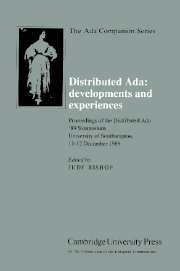 Distributed Ada: Developments and Experiences
Distributed Ada: Developments and Experiences Published online by Cambridge University Press: 13 October 2009
ABSTRACT
Although Ada is now ten years old, there are still not firm guidelines as to how the distribution of an Ada program onto multiprocessors should be organised, specified and implemented. There is considerable effort being expended on identifying and solving problems associated with distributed Ada, and the first aim of this paper is to set out where the work is being done, and how far it has progressed to date. In addition to work of a general nature, there are now nearly ten completed distributed Ada implementations, and a second aim of the paper is to compare these briefly, using a method developed as part of the Stadium project at the University of Southampton. Much of Southampton's motivation for getting involved in distributed Ada has been the interest from the strong concurrent computing group, which has for several years taken a lead in parallel applications on transputers. The paper concludes with a classification of parallel programs and a description of how the trends in distributed Ada will affect users in the different groups.
COLLECTIVE WORK ON DISTRIBUTED ADA
The major forums where work on distributed Ada is progressing are Ada UK's International Real-Time Issues Workshop, the Ada 9X Project, SIGAda ARTEWG and AdaJUG CARTWG. Reports of these meetings appear regularly in Ada User (published quarterly by Ada UK) and Ada Letters (published bi-monthly by ACM SIGAda). The status of their activities is summarised here.
To save this book to your Kindle, first ensure no-reply@cambridge.org is added to your Approved Personal Document E-mail List under your Personal Document Settings on the Manage Your Content and Devices page of your Amazon account. Then enter the ‘name’ part of your Kindle email address below. Find out more about saving to your Kindle.
Note you can select to save to either the @free.kindle.com or @kindle.com variations. ‘@free.kindle.com’ emails are free but can only be saved to your device when it is connected to wi-fi. ‘@kindle.com’ emails can be delivered even when you are not connected to wi-fi, but note that service fees apply.
Find out more about the Kindle Personal Document Service.
To save content items to your account, please confirm that you agree to abide by our usage policies. If this is the first time you use this feature, you will be asked to authorise Cambridge Core to connect with your account. Find out more about saving content to Dropbox.
To save content items to your account, please confirm that you agree to abide by our usage policies. If this is the first time you use this feature, you will be asked to authorise Cambridge Core to connect with your account. Find out more about saving content to Google Drive.